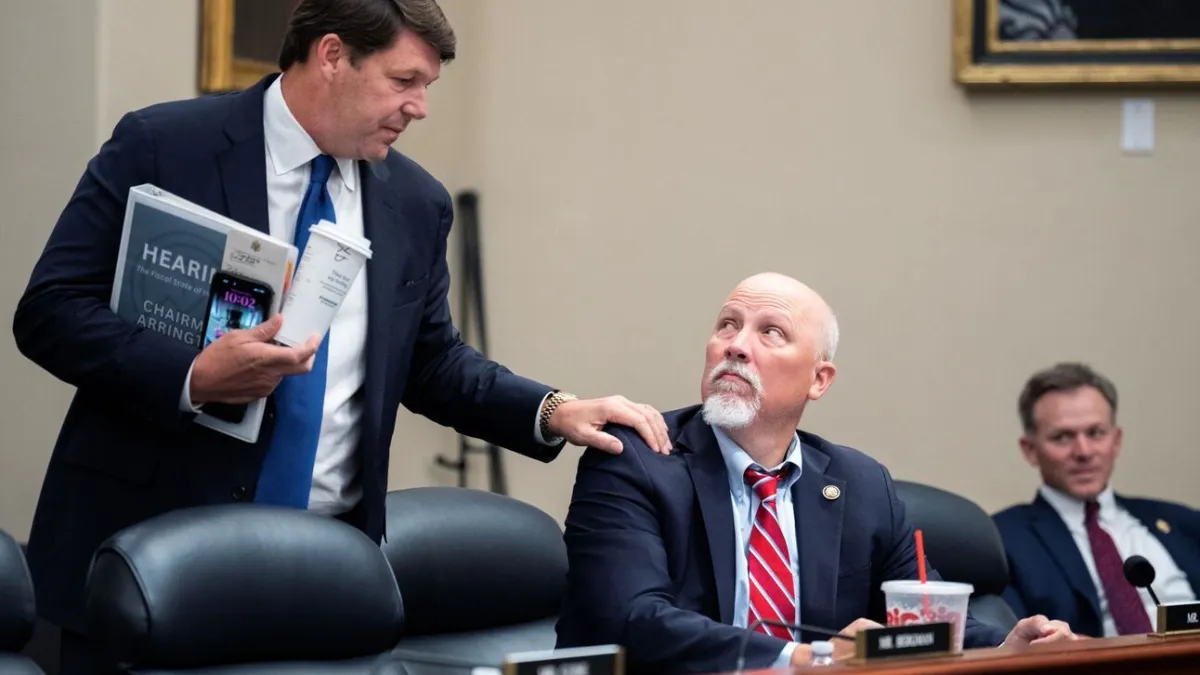Republican Hardliners Deal Stunning Blow to Trump Agenda

Lots of big news on this Friday. Fiscal hawks handed President Donald Trump and House Speaker Mike Johnson an embarrassing setback, and the fiscal analysts at Moody's dealt U.S. debt an embarrassing downgrade. We've got details.
GOP Hardliners Deal Stunning Blow to Trump Agenda
President Trump and Speaker Mike Johnson suffered an embarrassing setback in the House Budget Committee on Friday as conservative holdouts blocked the massive bill containing trillions of dollars in tax cuts and other parts of the Republican legislative agenda.
The budget panel voted 21-16 against the megabill, with five Republicans joining Democrats in opposing the package. Far-right conservatives had expressed their anger about the bill, complaining that it failed to cut enough spending and that key parts of the law, including new work requirements in Medicaid and a phaseout of some clean energy tax credits, would not start until 2029. Republican Rep. Chip Roy of the House Freedom Caucus posted a chart to social media on Friday showing that the package front-loads its tax cuts and spending but delays its biggest savings.
House leaders reportedly were negotiating changes to the package, seeking to strike a difficult balance between conservative demands for bigger spending cuts and moderates' concerns that the bill's cuts and any additional changes could be politically ruinous. The Budget Committee went ahead with the vote even as it appeared likely to fail - a decision that reportedly left many House Republicans bewildered and fuming.
"We were making progress, but the vote was called, and the problems were not resolved, so I voted no," Roy wrote on X. "I am staying in Washington this weekend to deliver. Medicaid Work requirements must start NOW not 2029 & the Green New Scam must be fully repealed, as President Trump called for."
Roy was joined by Reps. Josh Brecheen of Oklahoma, Andrew Clyde of Georgia and Ralph Norman of South Carolina in voting against the bill. Rep. Lloyd Smucker of Pennsylvania changed his vote from yes to no in a procedural move meant to allow the committee to reconsider the legislation.
Trump had urged Republicans to come together behind the bill. "Republicans MUST UNITE behind, 'THE ONE, BIG BEAUTIFUL BILL!' Not only does it cut Taxes for ALL Americans, but it will kick millions of Illegal Aliens off of Medicaid to PROTECT it for those who are the ones in real need," he wrote in a social media post, adding, "We don't need 'GRANDSTANDERS' in the Republican Party. STOP TALKING, AND GET IT DONE!"
Republicans will continue negotiating over the weekend and try again to "get it done" on Sunday, when the budget panel will meet at 10 p.m. to revote.
"While there are still a few issues being resolved from members on and off Committee, moving forward with our Budget markup provided the clarification and catalyst we needed to keep us on track for final passage," Rep. Jodey Arrington, the Republican chairman of the committee, said in a statement. "Passing a big and beautiful bill takes time and hard work. I am confident we will get to a good place this weekend and have the votes to pass it out of Committee Sunday evening."
House Republican leaders have been aiming to pass the bill next week before lawmakers depart for their Memorial Day recess.
The bottom line: The GOP package, officially named the "One Big Beautiful Bill Act," is delayed, not dead. While Republicans may still recover quickly from Friday's stumble, this is unlikely to be the last big challenge the legislation faces.
US Loses Its Last Triple-A Credit Rating
Citing large and growing budget deficits and rising interest costs, Moody's Analytics on Friday reduced its credit rating on U.S. government debt, eliminating the last top-ranked, triple-A rating for the nation's debt among the three major credit agencies.
"Successive U.S. administrations and Congress have failed to agree on measures to reverse the trend of large annual fiscal deficits and growing interest costs," Moody's said in a statement. "We do not believe that material multi-year reductions in mandatory spending and deficits will result from current fiscal proposals under consideration."
The U.S. rating is now Aa1, one notch below the highest rating of Aaa, the same level as Austria and Finland, per The Wall Street Journal. Moody's also said it considers the U.S. outlook to be "stable," in part because to the continued effectiveness of the independent Federal Reserve.
The ratings agency expects budget deficits to grow, reaching nearly 9% of GDP in 10 years, up from 6.4% in 2024, "driven mainly by increased interest payments on debt, rising entitlement spending, and relatively low revenue generation."
Moody's follows the other major rating agencies in reducing its rating. Standard & Poor's downgraded its U.S. rating from AAA to AA+ in 2011, due to concerns about "the effectiveness, stability, and predictability of American policymaking and political institutions" during a time of "ongoing fiscal and economic challenges." Fitch lowered its rating of U.S. debt from AAA to AA+ in 2023, citing concerns about the nation's fiscal health and political administration.
Consumer Sentiment Falls Near Record Low
Americans' views of the economy continued to sour in May, as the University of Michigan's consumer sentiment index dropped to a preliminary reading of 50.8, down 3% from the final reading of 52.2 in April. It's the second-lowest reading for the index in data going back to the 1970s, behind only June 2022.
Inflation expectations worsened, too. Consumers now expect to see inflation hit 7.3% in the next year, up from the 6.5% rate projected last month. Long-term inflation expectations rose from 4.4% to 4.6%.
Worries about President Trump's trade war played a major role in the negative sentiment. "Tariffs were spontaneously mentioned by nearly three-quarters of consumers, up from almost 60% in April," said survey director Joanne Hsu. "[U]ncertainty over trade policy continues to dominate consumers' thinking about the economy."
Most of the survey was completed before China and the U.S. agreed earlier this week to reduce their historically high tariffs for 90 days. When the sentiment index for May is updated at the end of the month, we'll get a sense of whether the temporary cooling of the trade war helped ease consumers' minds, or if the continued instability and still relatively high tariffs continue to weigh on the outlook.
Paul Ashworth, an economist at Capital Economics, told The Wall Street Journal that the preliminary reading is "a bit disconcerting," but added that he thinks "it's a safe bet that inflation expectations will go down and sentiment will rebound in the final reading for May."
Still, although the worst of the tariff standoff may have passed, consumers continue to face the threat of higher prices in the coming months. On Thursday, retail giant Walmart warned that higher prices are almost certainly already in the pipeline.
"We're wired for everyday low prices, but the magnitude of these increases is more than any retailer can absorb," Walmart Chief Financial Officer John David Rainey told CNBC, referring to Trump's tariff increases, which function as a tax on domestic consumption of imports. "It's more than any supplier can absorb. And so I'm concerned that consumer is going to start seeing higher prices. You'll begin to see that, likely towards the tail end of this month, and then certainly much more in June."
Number of the Day: $45 Million
A military parade planned for Washington D.C. next month to celebrate the Army's 250th anniversary and President Trump's 79th birthday will reportedly cost between $25 million and $45 million, according to Reuters and The New York Times. The estimate reportedly does not include cleanup costs or any potential road repairs that might be necessary after dozens of vehicles, including M1 Abrams tanks, roll through the streets.
Fiscal News Roundup
- House Budget Panel Rejects GOP Megabill Amid Conservative Opposition – Politico
- Conservatives Block Trump's Big Tax Breaks Bill in a Stunning Setback – Associated Press
- The United States Just Lost Its Last Perfect Credit Rating – CNN
- Businesses Made a Big Tax-Cut Request. Republicans Said Yes-and Then Some – Wall Street Journal
- As Congress Debates Cutting Medicaid, a Major Study Shows It Saves Lives – New York Times
- $40,000 SALT Offer Discussed With Megabill Holdouts – Politico
- US Consumer Sentiment Nears Record Low on Inflation Concerns – Bloomberg
- Price Hikes Are Beginning to Threaten the American Consumer – Bloomberg
- GAO Rejects DOGE Attempt to Land at Congressional Watchdog Agency – Politico
- Trump Puts Wealth Fund on Back Burner as Ambitions Hit Limits – Bloomberg
- Financial Reckoning Hits Universities: Pay Cuts, Layoffs and No Coffee – Wall Street Journal
- Trump Suspends Asylum System, Leaving Immigrants to Face an Uncertain Future – Associated Press
- Need a Gun Silencer? You Might Get a Tax Break – Politico
- Trump Administration Terminates Nearly 600 Voice of America Employees – Politico
- Replacing US Military Support in Europe Would Cost $1T – Politico
Views and Analysis
- G.O.P. Tax Bill May Hurt the Lowest Earners and Help the Richest – Tony Romm, New York Times
- The Tax Code Gets a MAGA Makeover – Greg Ip, Wall Street Journal
- House's Latest Budget Is a Fiscal Time Bomb – Michael R. Bloomberg, Bloomberg
- Who Would Benefit From the GOP's Tax Bill? HENRYs – Justin Fox, Bloomberg
- Medicaid Work Requirements Are Cruel and Pointless – Matt Bruenig, New York Times
- SALT Means Cutting Medicaid to Give Tax Cut to the Rich – Ed Kilgore, New York
- The Pronatalist Party Escalates Its War on Children – Catherine Rampell, Washington Post
- Congress Needs to Vote on Qatar's $400 Million 'Gift' – Washington Post Editorial Board
- The Clean Energy Boom That Could Snarl the GOP Megabill – James Bikales, Politico
- House GOP's Approach to the IRA Clean Energy Tax Credits: Five Things to Know – Alex Muresianu, Tax Foundation
- Gavin Newsom's High-Tax Revenue Woes – Wall Street Journal Editorial Board
